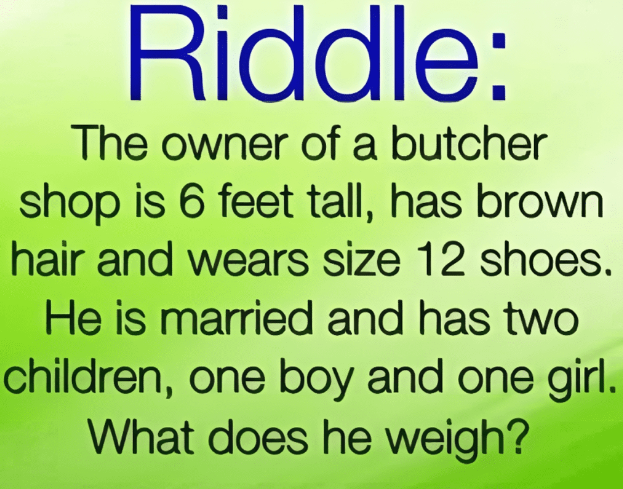Riddles have long captivated the human mind, offering a delightful blend of fun and mental exercise. They challenge us to think outside the box, pushing our cognitive abilities to the limit as we search for the clever twist that unlocks the answer. One riddle that has recently resurfaced online and sparked widespread fascination is the “Butcher’s Riddle.”

This seemingly simple yet deceptively complex puzzle poses a question that, at first glance, appears to be about the personal details of a butcher. However, as we’ll soon discover, the key to solving this riddle lies not in the butcher’s physical attributes, but rather in his profession. So, what is the answer to this mind-bending riddle, and what can it teach us about the power of critical thinking? Let’s dive in and unravel the surprising solution.
The riddle goes like this: “The owner of a butcher shop is 6 feet tall, has brown hair, and wears size 12 shoes. He is married and has two children, one boy and one girl. What does he weigh?”
At first glance, this riddle seems to be asking for the butcher’s personal weight, based on the detailed information provided about his physical characteristics. Many people might immediately start trying to estimate his weight using averages or calculations based on his height and shoe size.
However, the key to solving this riddle lies in the question itself. The riddle asks, “What does he weigh?” and the important detail here is that the person in question is a butcher. So, what does a butcher weigh? The answer: He weighs meat.
This simple yet ingenious twist is what makes the Butcher’s Riddle so captivating and deceptively challenging. It requires the solver to step back from the specific details provided and consider the broader context of the butcher’s profession. Once you make that mental leap, the answer becomes crystal clear.
The Butcher’s Riddle is a prime example of how critical thinking can help us see beyond the surface of a problem and unlock the solution. It teaches us not to get bogged down in extraneous details, but instead to focus on what’s truly relevant to the question at hand.
In this case, understanding the butcher’s profession was the key to unlocking the answer. By shifting our perspective from the individual’s physical characteristics to the context of his work, we were able to arrive at the clever twist that the riddle was hinting at all along.
This ability to think critically and approach problems from different angles is a valuable skill that can be applied to all sorts of challenges, both in our personal and professional lives. Engaging with puzzles and riddles like the Butcher’s Riddle is a fantastic way to exercise these cognitive muscles and improve our problem-solving abilities.

Riddles and brain teasers do more than just entertain us; they also offer tangible benefits for our mental well-being. Regularly engaging with these types of puzzles can:
Improve Problem-Solving Skills: Riddles require us to approach problems from new angles, fostering the development of creative and lateral thinking.
Enhance Cognitive Function: Solving puzzles and riddles can help keep our minds sharp, improving functions like memory, attention, and processing speed.
Boost Mood and Mental Stimulation: The sense of accomplishment and satisfaction that comes with solving a riddle can have a positive impact on our mood and overall mental state.
Encourage Social Interaction: Sharing and discussing riddles with others can be a fun and engaging way to bond and connect with friends, family, or colleagues.
So, the next time you encounter a mind-bending riddle, embrace the challenge and see it as an opportunity to flex your critical thinking muscles. Who knows, you might just surprise yourself with the clever twist that unlocks the solution!
The Butcher’s Riddle is a testament to the power of critical thinking and the joy of solving puzzles. By looking beyond the surface-level details and considering the broader context, we can uncover the clever twist that leads us to the unexpected answer. This riddle not only entertains us but also highlights the benefits of regularly engaging with brain teasers and puzzles, which can help sharpen our cognitive abilities and improve our overall mental well-being.
As we’ve seen, the key to solving the Butcher’s Riddle lies in shifting our perspective and focusing on what’s truly relevant to the question. By adopting this mindset, we can not only crack the code of this iconic puzzle but also apply these critical thinking skills to tackle a wide range of challenges in our daily lives.
So, the next time you come across a mind-bending riddle, embrace the opportunity to flex your mental muscles and see where your creativity and lateral thinking can take you. Who knows, you might just surprise yourself with the ingenious solution that leaves everyone else scratching their heads in awe.


